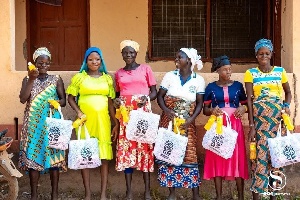- Home - News
- Elections 2024
- News Archive
- Crime & Punishment
- Politics
- Regional
- Editorial
- Health
- Ghanaians Abroad
- Tabloid
- Africa
- Religion
- Photo Archives
- Press Release
Health News of Thursday, 24 April 2025
Source: www.ghanawebbers.com
Zero maternal deaths recorded in Saboba after implementation of Samira Bawumia’s Safe Delivery Project
The Safe Delivery Project, led by former Second Lady Hajia Samira Bawumia, has achieved a historic milestone. In the Saboba District of the Northern Region, there were zero maternal and neonatal deaths during the project’s implementation. This success was celebrated at a grand durbar in Saboba marking the project's official close.
The event included government officials, health professionals, religious leaders, and expectant mothers. The project began in May 2018 to reduce maternal and neonatal mortality in underserved communities across Ghana. It promotes safe delivery practices through initiatives like distributing birth kits to expectant mothers.
These birth kits contain essential supplies for safe deliveries. They include medicated soap, a clean delivery mat, methylated spirit for disinfection, and sterile gloves. Other items are gauze swabs, a baby hat for warmth, anti-haemorrhage prophylaxis, and prenatal vitamins for mothers.
The project also focuses on improving local health facilities. It provides training for health workers and Traditional Birth Attendants (TBAs) on safe delivery practices. Hon. Dominic Nitiwul praised the project's achievements on behalf of Mrs Bawumia.
He emphasized that no woman should die while giving life. The Safe Delivery Project has significantly improved conditions in Saboba. Over 4,000 expectant mothers received birth kits during this initiative.
Additionally, antenatal and postnatal care attendance increased by 79 percent. Paramount Chief Ubor Bowan John Mateer Sakojim IV commended Mrs Bawumia's support for women and children. He noted that since April 2023, there have been no institutional deaths in the district.
Mr. Zaid Arimiyaw, District Director of Health Services for Saboba, also praised SEHP's efforts. He highlighted that many women previously gave birth under unsafe conditions before this intervention. Now they can proudly say no mother or newborn was lost during this period.
The project builds on successes from similar interventions in East Gonja Municipality and North East Gonja Districts. These areas also saw significant reductions in maternal mortality after SEHP’s involvement.
Other speakers urged continued training for health workers and community engagement. They called for integrating such initiatives into national policy frameworks as well. Hajia Samira Bawumia expressed gratitude to all stakeholders involved in making the project successful.
She emphasized that this is just the beginning of broader commitments to maternal healthcare across Ghana. Her goal is to ensure every Ghanaian mother has access to safe childbirth regardless of location.
Entertainment










